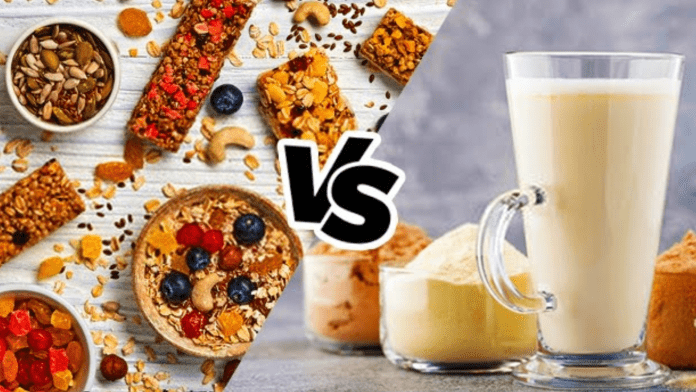When it comes to maximizing the results of your workout, proper nutrition is essential. Protein, in particular, plays a crucial role in muscle repair and growth, making it a popular choice for fitness enthusiasts. Two convenient and popular options for incorporating protein into your post-workout routine are protein drinks and protein bars. Both offer a quick and portable way to replenish your body’s protein stores, but which one is the best pick? In this article, we will delve into the benefits and drawbacks of each to help you make an informed decision based on your individual needs and preferences.
Protein Drinks:
Protein drinks, also known as protein shakes or protein smoothies, are beverages that provide a concentrated dose of protein in liquid form. They are typically made by mixing protein powder with water, milk, or a milk alternative. Some may also contain additional ingredients like fruits, vegetables, or nut butters to enhance flavor and nutritional content. Here are the key points to consider:
Pros:
1. Fast Absorption: Liquid protein is quickly absorbed by the body, making it an ideal choice for immediate post-workout recovery. It helps repair damaged muscles and replenish glycogen stores.
2. Customizable: Protein drinks offer versatility in terms of flavor and nutritional content. You can tailor your shake to suit your taste preferences and dietary requirements.
3. Convenience: Preparing a protein shake is quick and easy, requiring minimal time and effort. They are also easily portable, making them an excellent option for on-the-go individuals.
Cons:
1. Artificial Ingredients: Some pre-made protein drinks may contain artificial flavors, sweeteners, and preservatives. It’s essential to read the ingredient list and opt for more natural alternatives when possible.
2. Digestive Sensitivity: Some individuals may experience digestive discomfort when consuming protein drinks due to lactose intolerance or sensitivity to certain protein sources.
3. Nutritional Balance: While protein drinks provide a concentrated source of protein, they might lack other essential nutrients found in whole foods.
Protein Bars:
Protein bars are portable, ready-to-eat snacks that offer a blend of protein, carbohydrates, and fats. They come in various flavors and formulations, including whey protein, plant-based protein, and nut-based options. Let’s examine the pros and cons of protein bars:
Pros:
1. Convenience: Protein bars are pre-packaged and require no preparation, making them a convenient option for busy individuals or when you’re on the move.
2. Nutritional Variety: Many protein bars contain a balanced blend of macronutrients, including protein, carbohydrates, and fats. This combination can provide sustained energy and help keep you feeling full.
3. Portion Control: Protein bars come in pre-portioned servings, making it easier to manage your caloric intake and avoid overeating.
Cons:
1. Added Sugar and Preservatives: Some protein bars can be high in added sugars and artificial preservatives, reducing their overall nutritional value. Reading the ingredient list is crucial to choosing a healthier option.
2. Digestive Issues: Like protein drinks, some people may experience digestive discomfort when consuming protein bars due to certain ingredients or food sensitivities.
3. Cost: Protein bars can be more expensive than other protein sources, such as protein powder or whole foods.
Which One Is the Best Pick?
The best pick between protein drinks and protein bars ultimately depends on your individual goals, preferences, and lifestyle. Here are some guidelines to help you decide:
1. Post-Workout Recovery: If your primary goal is to optimize post-workout recovery and muscle repair, protein drinks are an excellent choice due to their rapid absorption and quick delivery of amino acids to your muscles.
2. Convenience and Portability: For those constantly on the go or without easy access to kitchen facilities, protein bars may be more practical. They can be stashed in your bag for a quick and easy snack.
3. Nutritional Balance: If you prefer a more balanced nutritional profile with a mix of protein, carbs, and fats, protein bars might be a better fit. They can provide sustained energy and help prevent energy crashes.
4. Personal Preferences: Taste and texture play a significant role in dietary choices. Experiment with different protein drinks and bars to find the flavors and formulations that suit your palate best.
Combining Both for Maximum Benefit:
In some cases, the best approach might be to use both protein drinks and protein bars strategically. For example, consider having a protein drink immediately after your workout for fast absorption and muscle recovery. Then, if you anticipate a long gap before your next meal, having a protein bar on hand can help you maintain energy levels and prevent hunger.
Final Thoughts:
Both protein drinks and protein bars offer convenient ways to supplement your protein intake and support your fitness goals. Protein drinks are ideal for immediate post-workout recovery and customization, while protein bars provide a balanced nutritional profile and portability. Ultimately, the best pick depends on your unique needs and preferences. By incorporating these options wisely into your diet, you can fuel your workouts and enhance your overall fitness journey. Remember always to read the ingredient labels to choose healthier options and consult with a nutritionist or dietitian if you have specific dietary concerns or restrictions.





